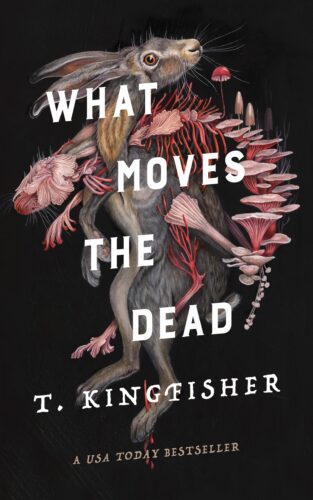 Something Devastating at Usherland
Something Devastating at Usherland
Author: T. Kingfisher
Something strange is happening in the countryside of Ruritania. The stagnate lake glows at night; strange, fetid mushrooms, seen nowhere else, dot the landscape; the hares drag themselves at an abnormal, disjointed gate and stare through your soul; and Madeline Usher is dying, strange white filaments growing and waving from her skin. Childhood friend Alex Easton, a retired soldier from the land of Galatia, has been called to Madeline’s sickbed. Alex doesn’t know what to expect, and hardly understands the weird sites, nighttime wanderings, and sickly animals that surround the decaying Usherland. Roderick Usher, Madeline’s brother, swears that moving her will kill her, yet it is evident that he knows more. As events grow from strange to terrifying to violent, Alex seeks the aid of a British mycologist and Madeline’s perplexed American doctor. What they discover will haunt them and scar the formerly peaceful countryside forever.
What Moves the Dead is another retelling of Edgar Allan Poe’s famous short story, The Fall of the House of Usher. At this point, having had two separate book clubs pursue retellings, I need to just sit down with the original story and read it. I haven’t yet, so I can only comment that T. Kingfisher deviates from the original Usher malady. Madness, of course, still plays a part in this dark tale, but there is something even more terrifying at work, something that literarily moves the dead.
The story starts strangely with Alex, the point-of-view character. Alex is a soldier from a nearby land who served with Rodrick Usher in some long-forgotten war and grew up a friend of both the now orphaned Usher siblings. But Alex hasn’t seen the Ushers in years, and this return is fraught, not only by the news of Madeline’s illness, but by Alex’s fear of discrimination. This is where T. Kingfisher introduces a modern debate to a tale with an old-world, Victorian feel, jarring the readers out of the atmosphere.
Alex uses they/them pronouns, and this is something that stops the narrative A LOT in the beginning as Alex talks about assigned gender and discrimination of women in Galatia who, for one reason or another, chose not to live as women. Through a military loophole, these women can become “ka/kan,” a pronoun used only for soldiers, making them genderless, or above gender. Alex is concerned that the American doctor will react to her presence as a solider of unknown gender, or as a person who chooses not to live as either gender, beginning the never-ending explanations and defenses. This gets tiresome and distracts from the building atmosphere of paranoia, which starts and stops a lot as Alex comes on scene. Alex is so worried about what people will think of her (spoiler, none of the characters care) that it detracts from all things spooky and gruesome. After all, this story isn’t about Alex, but about an ancient evil in the land.
Eventually, Kignfisher moves beyond this weird modern segway and gets comfortable with the story, introducing us to said evil. This is when it gets good. Really good. Really, really, really good. And did I say eerie? While Alex is self-absorbed and inappropriately humorous at times, she takes a back seat to the growing horror. And by growing, I mean exactly that. Queue thankfully non-explicit body horror.
In the style of my beloved Mexican Gothic this is a very organic tale of fear, one with an old-world gothic flare (except for the distracting they/them asides). Kingfisher’s general idea may no longer be unique (as a matter of fact, this sort of biological / parasitical boogeyman is gaining popularity), but it is extremely immersive. It’s visceral and dark with terrifying what-if consequences that keep us awake at night and shuddering at our seemingly innocent natural world.
The descriptions here, too, although not as lengthy as Poe’s, still capture that world of old manor houses, rain heavy skies, and the musty scent of aristocratic despair. And the hares – good Lord, how can something so cute become so utterly disturbing!
The literal twists keep the second part of the book, after Alex shuts up, moving and escalating quickly. Once Alex gets a sense of what is starting to go on, it’s far too late to stop what happens next.
Overall, it’s a short tale, like the story that inspired it, but an altogether unforgettable one. The atmosphere is just right, and despite the time it takes to get on its feet, What Moves the Dead quickly becomes immersive. You could even say, it grows on you!
– Frances Carden
Follow my reviews on Twitter at: https://twitter.com/xombie_mistress
Follow my reviews on Facebook at: https://www.facebook.com/FrancesReviews
- Book Vs Movie: The Shining - April 6, 2020
- Thankful For Great Cozy Mysteries - December 13, 2019
- Cozy Mysteries for a Perfect Fall - October 20, 2019



